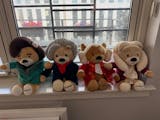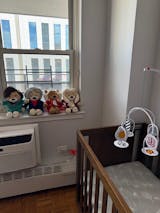Childhood development is profoundly influenced by the simplest of children's interactions, particularly through their play with toys. From the moment a child grasps their first toy, they embark on a journey of discovery and learning.
Toys are not simply playthings; they are fundamental instruments that stimulate the senses, ignite the imagination, and help build complex skills ranging from physical coordination to emotional intelligence.
As children engage with various toys, each type plays a specific role in their developmental process. Building blocks, for example, teach problem-solving and fine motor skills, while dolls and action figures encourage empathy and social understanding through role-play.
Playing is thus a critical educational process that teaches children about the world and their place within it through direct, hands-on experiences. Among the array of educational tools,musical toys stand out for their ability to blend auditory stimulation with tactile interaction, making them especially valuable in developing cognitive and social skills.
These toys, from simple rattles to more complex electronic keyboards, offer a multisensory experience rich indevelopmental benefits. By integrating sound, movement, and often visual elements, musical toys create a rich tapestry of experiences that foster an environment conducive to learning and growth in the crucial early years of childhood development.
Understanding the role of toys in childhood development
Toys are more than mere entertainment; they are tools that help children learn about the world. Through play, toys aid in developing motor skills, enhancing sensory recognition, and fostering creativity.
Each toy a child plays with becomes a stepping stone in their developmental journey. This interaction is critical as it shapes how they perceive and understand their surroundings.
Each toy category impacts childhood development differently, from building blocks to art supplies. Building blocks, for example, enhance spatial awareness and problem-solving skills, while art supplies encourage creativity and fine motor skills. This diverse range of toys helps children develop crucial skills in their early years.
Toys like puzzles and logic games challenge a child's reasoning abilities and cognitive functions. These toys require children to think critically and solve problems, skills transferable to academic subjects like mathematics and science.
As children manipulate pieces to fit them together or work through a sequence of actions to achieve a desired outcome, they are not only engaged in play but are also learning the basic principles of logic and sequence.
This kind of cognitive exercise is essential for brain development and helps lay the groundwork for successful learning and adaptation in more structured educational settings.Role-play toys such as dolls, action figures, and playsets allow children to explore the complexities of social interactions and emotional understanding.
By creating scenarios and dialogues, children practice communication, turn-taking, and empathy, putting themselves in the shoes of others. This type of play enriches their emotional intelligence, teaching them about relationships, social cues, and the emotional responses appropriate to various situations.
Role-play enhances a child's social skills and allows them to process their feelings and experiences, making it a crucial aspect of their emotional and social development.
The significant impact of musical toys on childhood development
Musical toys play a pivotal role in childhood development. These toys, which produce sounds or music, engage a child's auditory senses and significantly enhances their cognitive abilities. The exposure to different rhythms and melodies helps develop auditory discrimination, an essential skill forlanguage development.
Musical toys also stimulate memory and learning skills. As children learn to associate specific actions with sounds, such as pressing a button to hear a tune, they enhance their memory and learning capabilities through repetition and reinforcement.
This interaction not only makes learning enjoyable but also embeds deep cognitive connections that are vital for educational success. Musical toys foster emotional development. Music inherently carries the ability to convey emotions, and by engaging with musical toys, children learn to express their feelings through sound.
This expression is a fundamental aspect of emotional health and helps children to communicate their feelings better as they grow. Musical stuffed animals, a subset of musical toys, offer a unique blend of auditory stimulation and comforting physical presence.
These plush toys, often equipped to play soft classical music or soothing lullabies, serve as friends and musical instructors. When a child hugs or interacts with a musical stuffed animal, they feel the warmth and comfort of the plush toy and are soothed by the melodies it plays.
This dual stimulation greatly enhances a child's emotional and sensory development, providing a safe and inviting way to explore their feelings and sensory inputs, which are crucial during their formative years.
Musical stuffed animals may play an instrumental role in developing social skills. The music from these toys often encourages children to engage in shared play sessions where they can take turns activating the music or singing along with their peers. This makes the play more enjoyable and teaches them about cooperation and sharing.
As children interact with these musical cues, they also develop verbal and non-verbal communication skills, further enhancing their social development and preparing them for more complex social environments.

Exploring the educational benefits of toys in childhood development
Toys are not only about play but are also educational. Educational toys, designed to stimulate a child's mind, play an essential role in teaching them about various subjects like math, science, and language. These toys often come with built-in activities that challenge the child's thinking and help sharpen their cognitive abilities.
For instance, puzzle toys that require a child to match shapes or solve problems can improve their analytical skills and attention to detail. These toys encourage children to think critically and can enhance their academic skills at a very young age.
Role-play toys such as kitchen sets, doctor's kits, and tool benches allow children to mimic and understand various adult roles and responsibilities. This type of play enriches their imagination and promotes social skills by encouraging interaction with peers and adults in a structured play environment.
Children learn about the world around them through these scenarios, gaining insight into different professions and daily life activities, which helps develop empathy and social understanding.
Art and craft supplies also serve as crucial educational tools, enabling children to express themselves creatively whilerefining motor skills. These activities support the development of hand-eye coordination and fine motor control as children cut, glue, paint, and draw.
Engaging with art supplies helps children in problem-solving as they figure out how to achieve certain effects with colors and textures. It also allows for expressing feelings and ideas, fostering emotional maturity and cognitive flexibility by considering multiple perspectives and solutions.
Social skills and toys: Learning to interact through play
Toys also play a crucial role in the development of social skills. When children play with others, they learn valuable lessons about sharing, collaboration, and teamwork. Games that require taking turns or cooperating with others teach children how to interact socially in a fun and engaging way.
Role-play toys allow children to understand different perspectives and develop empathy. By stepping into another's shoes, children learn about roles, norms, and behaviors, essential components of social interaction.
Board games and card games that involve strategy and negotiation skills provide children with complex social interactions in a structured format. These games challenge children to think critically about others' motives and possible moves, enhancing their ability to anticipate and adapt to others' actions in real time.
Such gameplay encourages verbal communication and conflict resolution skills, as children must express their thoughts and negotiate terms with peers, learning to resolve disputes amicably and understand the value of compromise.
These experiences are invaluable as they lay the groundwork for effective communication and relationship-building skills that are crucial throughout life.
Musical toys as catalysts for group interaction
Musical toys often serve as excellent tools for group play. When children engage in activities involving musical toys, they learn to work together to create harmonies or coordinate their actions to produce a particular melody.
This collaborative play is crucial as it enhances teamwork skills and teaches children about the importance of working together to achieve common goals.
In addition to fostering teamwork, musical toys encourage leadership and initiative among children. During musical games and activities, some children naturally take on the role of leading the group, guiding others in when to play their instruments or sing their parts.
This leadership experience helps children develop confidence and decision-making skills. They learn to guide, support, and inspire their peers, key components of effective leadership. Engaging in such roles from a young age prepares them for future scenarios in school and later in their careers, where these skills will be invaluable.
Musical toys also provide a platform for children to experiment with sounds and rhythms, thus enhancing their creative expression. As they explore different instruments and the sounds they produce, children learn about musical concepts such as pitch, tone, and rhythm.
This exploration stimulates their auditory senses and sparks creativity as they develop new ways to combine sounds into music. This creative process plays a fundamental role in cognitive development, helping children think outside the box and develop innovative solutions to problems. Academic and professional settings highly value these skills.

The transformative power of toys in childhood development
The world of toys is a vibrant gateway to understanding the complexities of childhood development. Each toy that a child picks up not only entertains but also educates, shaping their understanding of the world in a fun and engaging manner.
Whether it's solving puzzles, building towers, or orchestrating a symphony with musical toys, every action plays a part in honing a child's cognitive, social, and emotional skills. These are not mere games; they are crucial learning experiences that contribute significantly to a child's development, preparing them for future challenges in school and life.
Musical toys, in particular, serve a dual role by combining the joy of music with the fundamentals of learning. The rhythms and melodies introduce children to the patterns and sequences that underpin much of our thinking and reasoning.
This exposure enhances auditory and language skills and fosters a sense of rhythm and timing that is essential in various aspects of life, from academic subjects like mathematics to personal skills such as communication and emotional expression. The interactive nature of these toys ensures that learning is an active, enjoyable process.
The impact of toys on early childhood development is profound and far-reaching. By carefully selecting toys that align with their developmental needs, parents and educators can provide children with a rich toolkit that promotes academic success, personal growth, and creativity.
Toys are the building blocks of a child's development, each one laying down the foundation for complex skills and lifelong learning. As such, they are invaluable investments in our children's future, deserving of attention and appreciation for their roles in shaping young minds.
Discover the charm of Virtuoso Bears, the pinnacle of musical stuffed toys!
Experts have expertly crafted these plush bears to provide soothing and educational experiences through classical music. Each Virtuoso Bear comes equipped with a carefully selected playlist lasting 40 minutes, featuring pieces from iconic composers likeMozart,Beethoven, andChopin.
Ideal for both home and educational settings, these bears serve as comforting companions that can calm during downtime or engage during learning activities, effectively blending the enriching qualities of classical music with the fun of playtime learning.
For teachers, Virtuoso Bears are fantastic tools for instilling a passion for music, enhancing concentration, or simply adding a serene musical atmosphere to the classroom. Parents will find these bears valuable as they help weave musical education into everyday home life, making learning seamless and enjoyable.
Whether you pick a single bear to cherish orgather several to enrich the musical experience, integrating Virtuoso Bears into your educational repertoire ensures that each interaction with music is as enriching as it is delightful, setting the stage for a lifelong appreciation of classical melodies.


